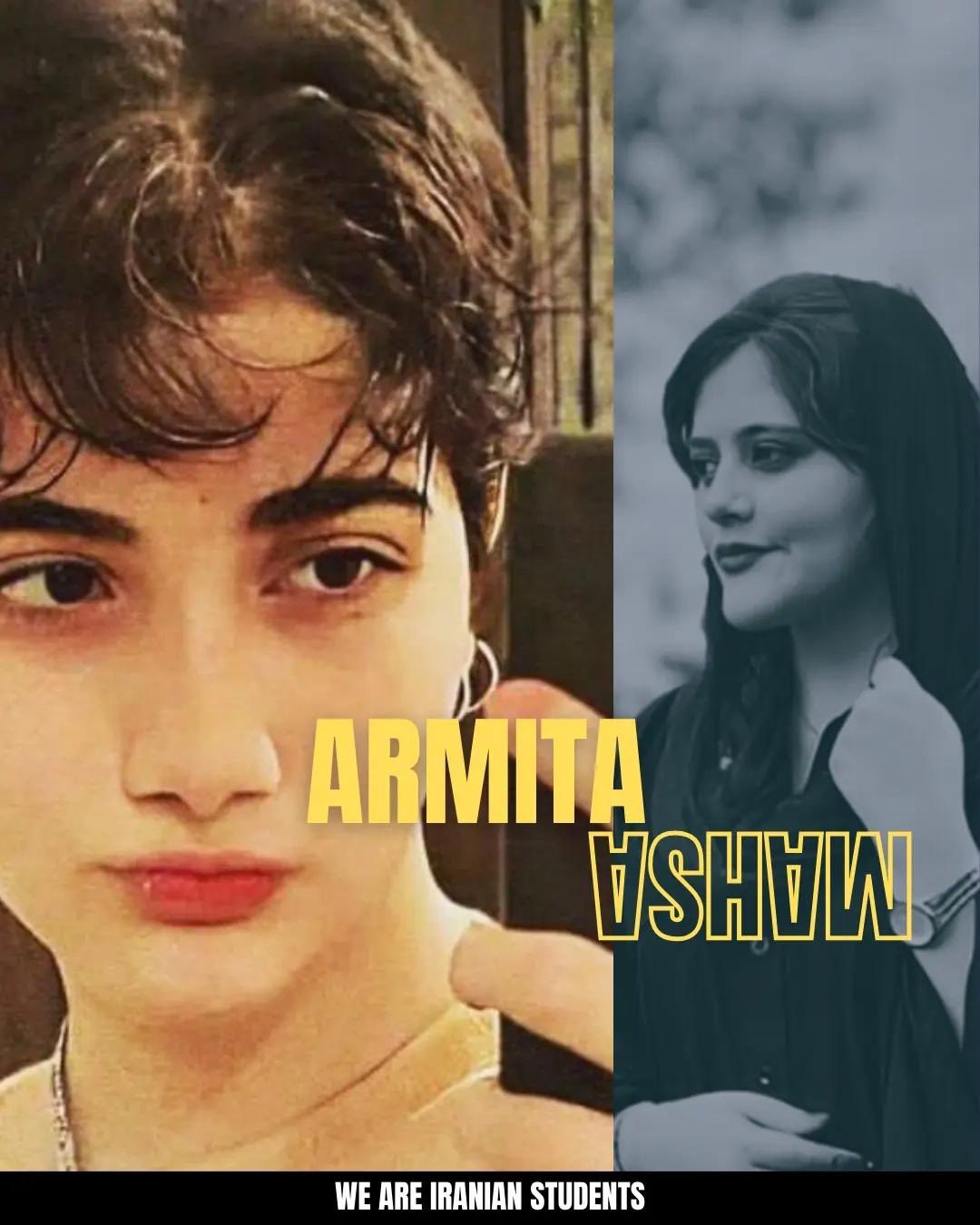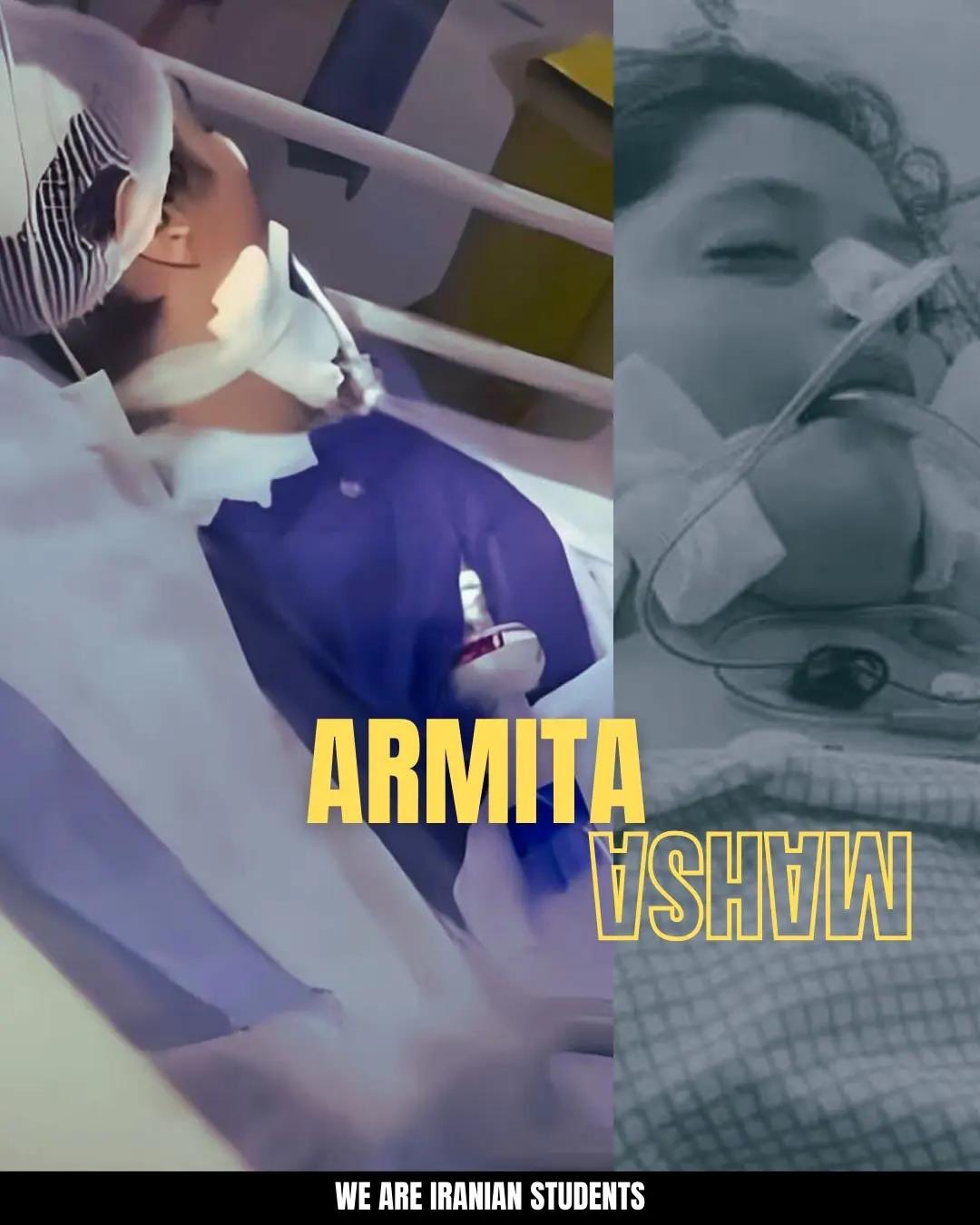Armita Garavand (Geravand) is 16 years old and attended “Arwa al-Wathqi” Art Academy in Tehran, Iran.
On October 1, 2023, a grainy Tehran Metro surveillance video on Iranian state TV shows that she and a group of friends, some of them without fully covered hair, entered the Tehran metro train. Moments later her friends pulled out her unconscious body. She was taken by ambulance to Fajr Air Force Hospital, where she underwent CPR and remains in coma.
What put 16-year-old Armita, with no prior medical conditions, in a coma?
Stencils of Armita Garavand going up on Tehran streets, Oct. 4.
The Islamic Republic of Iran media rushed to claim, with no evidence or witness, that Armita suffered a sudden loss of blood pressure and fell, hitting her head on the train.
Sounds familiar? One year ago, while 22-year-old Mahsa Jina Amini lay in a coma after being arrested by morality police, state officials claimed she suffered a heart attack unrelated to her arrest, and published a video of her collapsing after arriving at the morality “education” center.
Here are some details which are contradict or call into question the “official” version:
- On Oct. 5 The Guardian reported that an eyewitness described how a hijab enforcer immediately confronted Armita in the train. "The chador-clad woman screamed at her asking her why was she not covered. Armita then told her ‘Do I ask you to remove your headscarf? Why are you asking me to wear one?’ Their argument then turned violent. The hijab enforcer started physically attacking Armita and … violently pushed her.”
- The clock on the CCTV footage outside the train, released on state TV IRNA, appears to be missing 100 seconds, said opposition figures, per The Guardian. Cameras are constantly recording inside the trains but no footage has been released from inside the train or in the wider metro station,
- The Coordinating Council of Teacher's Organizations reported that the head of security from the Ministry of Education visited Armita's school. During this visit, teachers were threatened not to share any news or photos of Armita on social media. They were told that doing so could lead to heavy fines and immediate dismissal. Additionally, the head of security from the General Directorate of Education in Tehran also paid a visit to Armita's school. Alongside warning teachers, he cautioned Armita's classmates against sharing any information about her condition. Armita's friends who were with her on the day of the incident are facing immense pressure to deny any involvement or knowledge of what transpired.
- Journalist who went to Fajr Hospital to find information was temporarily arrested.
- Streets around Fajr Hospital are heavily controlled by police and military, all access to hospital is blocked.
- Hengaw reported that security forces confiscated cell phones from all members of Armita’s family, and no-one has been allowed to see her in the hospital.
- State TV ran a tape of her parents –under military and police pressure inside Fajr—saying that they were shown the video and saw no evidence on video she was assaulted, but even under the fear for their whole family and their daughter they did not go beyond saying that the officials told them to say. “I think they said she had low blood pressure… her head hit the edge of the metro and then (her friends) took her off (the train),” her mother said. Her father repeated, “I don’t know… what happened”. They have not been able to enter her IC unit or see her injuries.
These draconian high-level measures to prevent any spread of what happened to Armita that day are an indication that they do indeed have something to hide in her case – and beyond that, they are seriously worried about a new outbreak of protest around a case so reminiscent of the murder of Mahsa Jina Amini just over one year ago.
In reality, the hijab police, and in particular females both officially assigned and those who take it upon themselves to enforce hijab laws, have been intensifying their violent attacks on women without headscarves on the street and in the metro stations. For example, read this Iran Wire interview with Zahra Shafiei Dehaghani, an Iranian filmmaker arrested during the Jina anniversary protests in Tehran. She, along with some 500 other detainees, were subjected to brutal beatings on the face and head with batons by black-masked female security personnel.




